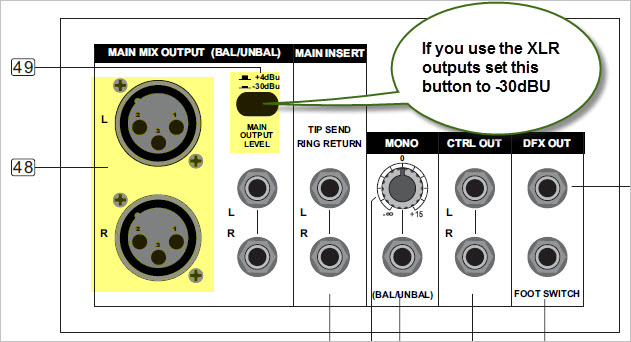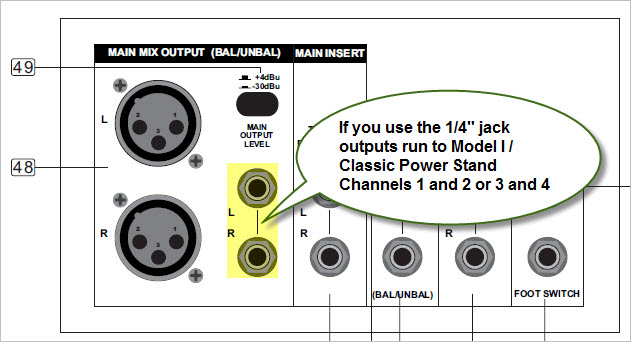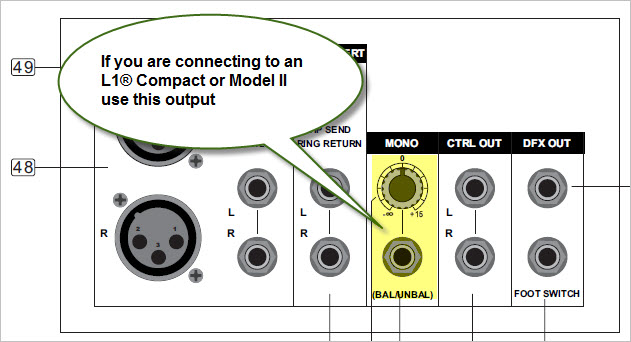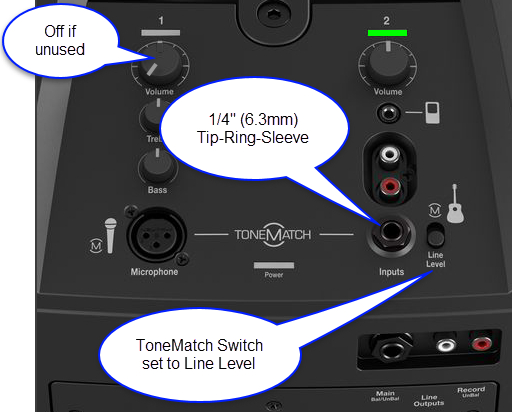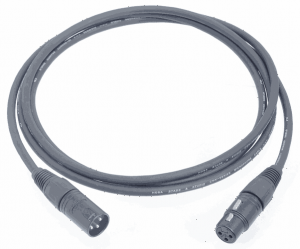Difference between revisions of "Mixer / Alto / L-12"
m (→Outputs: XLR comments about the L-12) |
m (→Outputs) |
||
| Line 10: | Line 10: | ||
== Outputs == | == Outputs == | ||
<!-- delete anything that is not applicable --> | <!-- delete anything that is not applicable --> | ||
| − | + | === Connnection to a Model I or Classic === | |
[[Image:AltoL-12Output1.jpg]] | [[Image:AltoL-12Output1.jpg]] | ||
This mixer has a button to attenuate the output to match microphone level inputs like those found on the {{Classic}} and {{Model I}}. | This mixer has a button to attenuate the output to match microphone level inputs like those found on the {{Classic}} and {{Model I}}. | ||
| + | or | ||
| + | |||
| + | [[Image:AltoL-12Outputs2.jpg]] | ||
| + | |||
| + | === Connection to a Model II === | ||
| + | |||
| + | [[Image:AltoL-12Outputs3.jpg]] | ||
| + | |||
| + | Connect to the {{Model II}} Analog Input | ||
| + | |||
| + | === Connection to a Compact === | ||
| + | |||
| + | [[Image:AltoL-12Outputs3.jpg]] | ||
| + | |||
| + | [[Image:Compact Channel 2 Line Level.png]] | ||
=== ¼ Inch with suitable output=== | === ¼ Inch with suitable output=== | ||
Revision as of 02:02, 23 October 2010
Alto L-12
Contents
Summary
Simplest thing that could possibly work.
Use the ¼ inch phone jack (Tip-Sleeve) outputs to
- The PS1 Power Stand (Classic) / Model I Channels 1 or 2 if you want to use the Presets and the R1 Remote Tone and Level Controls
OR - The PS1 Power Stand (Classic) / Model I Channels 3 or 4 if you prefer to leave Channels 1 or 2 open for other inputs. You will have to control Tone and relative Level (between the Channels) at your input source, as you do not have this control over Channels 3 and 4 in the PS1 Power Stand (Classic) / Model I or the R1 Remote.
You can use the XLR Balanced outputs.
Outputs
Connnection to a Model I or Classic
This mixer has a button to attenuate the output to match microphone level inputs like those found on the L1 Classic and L1 Model I.
or
Connection to a Model II
Connect to the L1 Model II Analog Input
Connection to a Compact
¼ Inch with suitable output
for PS1 Powerstand Channel 1 or 2 inputs
You can use TS (Tip Sleeve) unbalanced cables, or TRS (Tip Ring Sleeve) balanced cables, but since the ¼ inch phone connections at the Bose Classic and Model I Power Stand are unbalanced there is no particular benefit using balanced cables.
¼ Inch Tip-Sleeve (unbalanced) to ¼ Inch Tip-Sleeve (unbalanced)
This should work fine.
¼ Inch Tip-Ring-Sleeve (balanced) to ¼ Inch Tip-Sleeve (unbalanced)
This should work fine.
¼ Inch Tip-Ring-Sleeve (balanced) to ¼ Inch Tip-Ring-Sleeve (balanced)
This should also work, but likely no better than a simple ¼ Inch Tip-Sleeve to Tip-Sleeve cable. This is because the ¼ Inch input on the Bose System is Tip-Sleeve (unbalanced) anyway.
Cables you can use
XLR (balanced) to XLR (balanced)
(balanced to balanced) should be fine. This is the same kind of cable you would use to connect a microphone.
XLR Balanced Output to ¼ inch Phone Jack
XLR Female to ¼ Inch Tip-Sleeve
This should work well with any of the ¼ Inch inputs for Power Stand Channels 1, 2, 3, 4. Those inputs are all unbalanced. There is no particular benefit to using this kind of cable as compared to the one below.
XLR (balanced) to ¼ Inch Tip-Ring-Sleeve (balanced)
This should work well with any of the ¼ Inch inputs for Power Stand Channels 1, 2, 3, 4. Those inputs are all unbalanced, so there is no particular advantage to using this balanced cable compared to an unbalanced cable. There is no particular benefit to using this kind of cable as compared to the one above.
If you use the ¼ inch inputs
Use
- The PS1 Power Stand (Classic) / Model I Channels 1 or 2 if you want to use the Presets and the R1 Remote Tone and Level Controls
OR - The PS1 Power Stand (Classic) / Model I Channels 3 or 4 if you prefer to leave Channels 1 or 2 open for other inputs. You will have to control Tone and relative Level (between the Channels) at your input source, as you do not have this control over Channels 3 and 4 in the PS1 Power Stand (Classic) / Model I or the R1 Remote.
Links:
More Notes


